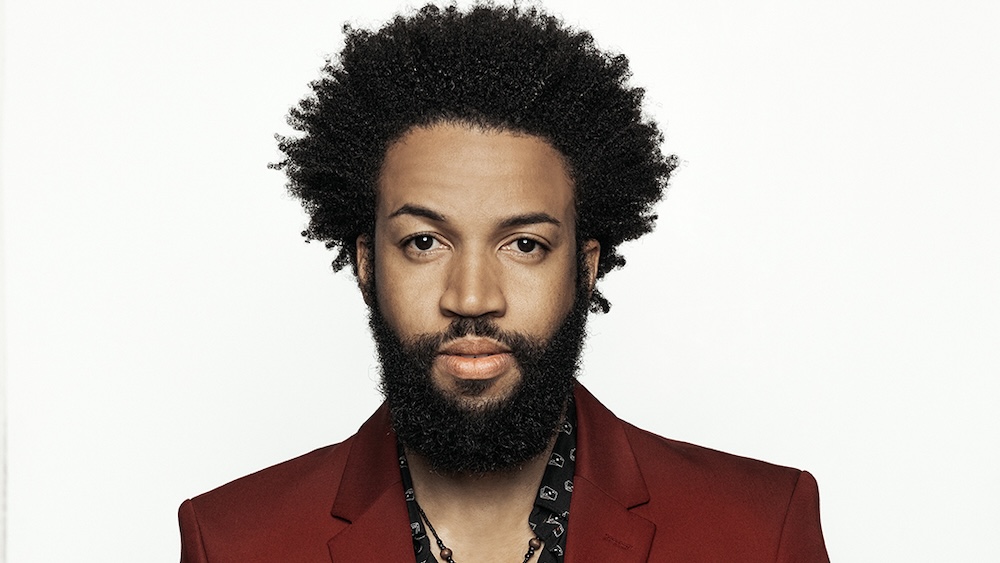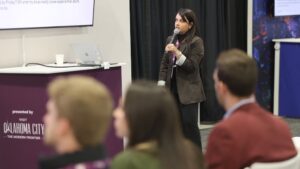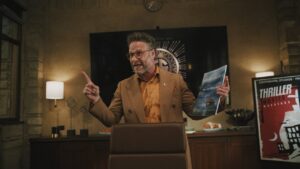


“Don’t look in someone else’s mirror expecting to see your reflection,” Denim Richards advises ahead of his edUcon Main Stage session. “Stay true to you but also don’t be so stuck in your ways that you are afraid to pivot [when something] isn’t working.”
Perhaps you recognize Denim Richards as Colby, the character he played opposite Kevin Costner in the hit TV series “Yellowstone” — or from dozens of other roles he has played over the past two decades on television, film, and in musical theater. But acting isn’t all Richards brings to the table — or to the Main Stage, for edUcon participants. He is an active entrepreneur, cultivating startups and promoting the entertainment industry in Africa, putting his own authentic stamp on every endeavor.
Today, he will pass along his strategies for building a personal brand with the edUcon audience on the Main Stage and in an interactive, 75-minute master class later this afternoon. He gave Convene a preview of what’s in store for participants via email in early May.
You describe yourself as a social anthropologist. What does that mean to you?
A social anthropologist is someone who studies human behavior and uses that information to elicit a certain outcome. For example, when actors get a script, we are reading about a character and then we must create mannerisms and a dialect and bring them to life off the page. In business, it’s important to study human behavior, especially when it comes to trends — what does the consumer want vs. why did they stop wanting what was previously available? I believe we are all anthropologists in our own ways — we may just identify it under a different title.
In addition to your acting and singing talents (opera, no less!), you’re an entrepreneur. Tell us more.
There are definitely some areas of my life that I have not highlighted as much as my acting, but they are equally as important to me. For example, I am the ambassador to Botswana with the African Union Sixth Region [dedicated to representing and advocating for the African diaspora worldwide] and global director for media, arts, and culture. It’s a position and opportunity that I take very seriously, and it also allows me to use my business and creative side of my brain. I also very much enjoy teaching the next generation about the arts, history of the arts, as well as the business side of the arts. There is something so magical about seeing the lights switch on in students’ eyes when it all clicks and comes together, which is why I am currently in a partnership with the University of Botswana teaching on those very same topics.
Why did you launch Opulent Entertainment Group?
I have always been interested in Africa — that is my lineage and roots, so I knew that when the opportunity arose, I wanted to play a more focal part in the direction of the continent, especially in the entertainment space. Opulent Entertainment Group was started with the sole desire to add more value, structure, and global feel to the African entertainment value chain. Our goal is not only to create jobs in the entertainment space, but we also hope to produce 10,000 hours of high-quality, original African content in the next three years. It’s a large goal but I always say, “Go big or go bigger!”
We also do a series of master classes called “The Business of Entertainment” because it’s entertaining sometimes, but a business all the time. This is to be able to equip everyone to understand the nitty-gritty details of all the behind-the-scenes chaos that is usually [part of] every production. Lastly, we do these master classes to demonstrate that the entertainment industry also supports all other industries of the world — food, tech, hospitality, legal, etc., therefore, there are many opportunities for employment in the entertainment space outside of acting, directing, and writing.
What other entrepreneurial ventures are you involved in?
Everything that I start or invest in has to solve a problem and add maximum value. I have been very blessed to be a part of companies that are adding local, ethical jobs, and providing value [to the community]. It’s great to make money but if you’re willing to do anything to make money, I believe that’s when your ethics will start to diminish. If you prioritize people, profits will come organically.
One of the greatest joys of being an entrepreneur is the opportunity to introduce different cultures, communities, and countries to a much broader audience and consumer base and that is what I am focused on with my companies in Africa. [They include a cigar company based in Mozambique, a high-end handmade leather bag company in Kenya, and a wine company with grapes grown and wine bottled and labeled in Stellenbosch, South Africa.] You will find that oftentimes it’s not that Africa doesn’t have quality products, it’s that there has been a massive lack in market share and visibility. With these companies, we are making a concerted effort to make sure everyone has the opportunity to know who we are.
Why is personal branding so important to you?
Creating a personal brand is essential — in the same way I believe that everyone should consider getting into some type of entrepreneurial head space. For [event professionals] it’s important because you are responsible for the experiences of people who are coming from all walks of life — older, younger, different ethnic groups, and religious backgrounds, on top of which there is usually big [organization] that also has high expectations of a ROI. It’s easy to get lost in people pleasing and under the banner of an [organization], so you have to find ways to add value, stick out, but also claim some autonomy of personal relationships — and also think about how you can use the tools that you have access to in order to better improve the value of your brand.
I will be sharing how I went from the “brand” (starring on “Yellowstone”) to my own personal international brand. We also will get to explore new and innovative ideas of branding and partnerships. My goal is that everyone who attends will leave with real, authentic, and tangible tools that they can instantly use the moment they get back to their corner of the Earth. I want to share everything that I have learned and I know I will learn just as much from everyone in attendance.
So much of my authenticity comes from knowing who am, where I am going, and having solid foundational roots. [One] thing I always stand by: Don’t look in someone else’s mirror expecting to see your reflection. Stay true to you but also don’t be so stuck in your ways that you are afraid to pivot [when something] isn’t working. Constantly look to find more ways to add value to yourself and your craft and that investment will pay off — it just might not happen in the timeframe we all set in our heads.
You’re a frequent speaker at conferences and conventions. What are some of your takeaways from those experiences?
I have been very fortunate to speak at a lot of different conferences all around the world and I never take that opportunity lightly. I always enjoy being on panels, whether I am speaking or moderating, with people who truly love what they do and take what they do seriously but are not super uptight. [It’s] better when you are talking with the audience and not at them. Open the room up for Q&As — I have learned so much from people in the room. Lastly, having a clear definition of how you monitor your KPIs — is it about actionable impact or is about numbers? I always feel like when the conference is “actionable” everything has meaning and purpose. Many [attendees] are paying with hard-earned money and they deserve to be participating in something where they can walk away with something tangible/actionable, not just a motivational speech. [Plus, networking:] I am always looking to learn and grow my network. Your network is your net worth.
Given all of the uncertainties that we are currently experiencing, how do you hold fast to — and express — your values?
If you don’t know who you are and what you want, someone else can and will define that for you. With uncertainty comes massive opportunity. Don’t look at it as a negative — find the gap and fill it. This, of course, requires work and dedication to solving problems, which I believe those in the event space are uniquely equipped for — there are so many fires [to put out] before and during an event but no one else knows about them. That’s because these are individuals who don’t harp on problems but excel in proactively solving them.
Michelle Russell is editor in chief of Convene.
This interview has been edited for brevity and clarity.







